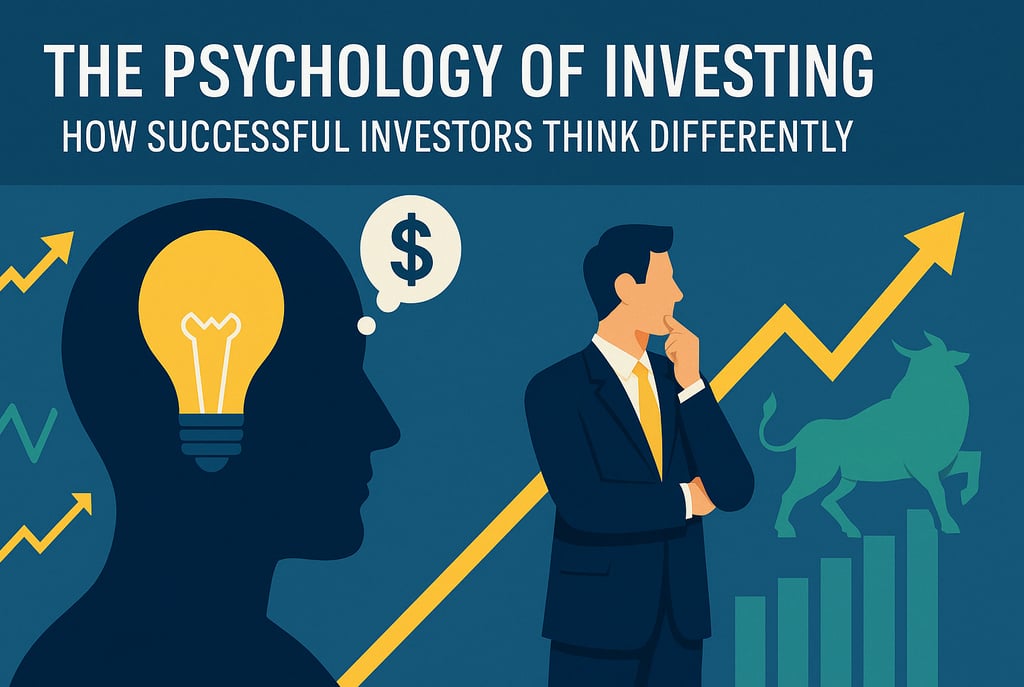The Psychology of Investing: How Successful Investors Think Differently
4/19/20253 min read


The Psychology of Investing: How Successful Investors Think Differently
Ask any successful investor the secret to their success, and you might be surprised. It’s not just about crunching numbers or reading balance sheets—it’s about mastering the mind (psychology of investing).
In reality, investing is as much a mental game as it is a financial one. While markets move based on economic data, how you react to those movements often decides your long-term results. Learning to think like the best investors means training yourself to stay calm, focused, and disciplined—no matter what the headlines say.
In this blog, let’s explore how successful investors approach the market differently and why mastering psychology might be the most valuable skill you develop on your financial journey.
Why Your Mind Matters More Than the Markets
Every day, news alerts, market crashes, and sudden rallies demand your attention. But seasoned investors know one truth: you cannot control the markets—you can only control your reactions.
Even with perfect knowledge, poor emotional control can wreck good strategies. Fear, greed, overconfidence, and herd behavior regularly cause investors to abandon solid plans at the worst possible moments.
That is why psychology isn’t just important—it is essential.
Traits That Set Successful Investors Apart
1. Emotional Discipline
Markets will tempt you every day—with both fear and excitement. Successful investors understand this and train themselves to stay steady. They stick to their strategies through thick and thin, not letting emotions hijack their decisions.
2. Patience Above All
In investing, patience often wins over brilliance. Building wealth takes years, sometimes decades. Those who can wait, endure market ups and downs, and allow compounding to do its magic, end up ahead.
3. Comfort with Uncertainty
No one can predict exactly what will happen tomorrow. Successful investors accept this uncertainty instead of fighting it. They diversify wisely and stay focused on probabilities, not guarantees.
4. Thinking Independently
When everyone else is rushing in one direction, the smartest investors often pause, reassess, and sometimes walk the other way. They trust their research and intuition, not the crowd’s excitement or fear.
5. Self-Awareness
Recognizing your own emotional patterns is half the battle. Great investors know when they are getting overconfident—or overly fearful—and adjust before emotions cause costly mistakes.
Psychological Traps That Catch Most Investors
Even experienced investors fall into mental traps if they are not careful. Here are a few of the most common:
Loss Aversion: We feel the pain of losses far more than the joy of equivalent gains. This can lead to irrational decisions.
Confirmation Bias: It’s tempting to only seek information that agrees with your current beliefs. Successful investors challenge themselves with opposing views.
Overconfidence: Thinking you can always pick winners or time the market perfectly is dangerous.
Recency Bias: Just because something happened recently doesn’t mean it will keep happening.
Herd Mentality: Following the crowd can feel safe but often leads to poor timing and regrets.
The key is not to eliminate emotions—that’s impossible. Instead, it’s about being aware of these tendencies and managing them wisely.
How to Build a Stronger Investment Mindset
Mastering your investment psychology (psychology of investing) doesn’t happen overnight. However, there are ways to train your mind:
Set Clear Goals: Know what you are investing for—retirement, a home, children’s education. Goals help you stay focused.
Create a Written Plan: Document your strategy. When markets get rough, your written plan will keep you grounded.
Automate Good Habits: Systematic investment plans (SIPs) remove emotional decision-making from the equation.
Review Regularly, Reflect Honestly: Checking in periodically helps you stay aligned with your goals and correct mistakes early.
Diversify Smartly: A balanced portfolio cushions you emotionally during market turbulence.
These habits can protect you from yourself—the biggest risk to your financial success.
What the Great Investors Teach Us
Look closely at the world’s most admired investors, and one lesson stands out: psychology matters more than predictions.
Warren Buffett attributes much of his success to emotional stability, not genius forecasting.
Charlie Munger constantly reminds investors about the traps of bias and emotional shortcuts.
Howard Marks insists that understanding market cycles emotionally—not just intellectually—is vital.
Ray Dalio champions radical self-awareness and humility in decision-making.
Clearly, mastering yourself is the foundation of mastering the markets.
Conclusion
At its core, investing is a journey of managing uncertainty, risk, and emotion. The tools of finance—ratios, models, analysis—are only as good as the mindset behind them.
If you want to build real wealth, focus first on mastering your own mind. Stay patient, stay independent, and stay humble. Recognize your emotions but do not be ruled by them.
Because in the long run, successful investing is not just about picking great investments—
it is about becoming the kind of person who can hold them wisely through every twist and turn the market throws your way.
Psychology of Investing
About One Solution
Quick Links
Contact Info
One Solution — Your trusted partner for financial success.
📍 F17, Grand Plaza, Paltan Bazar
Guwahati, Kamrup (M), Assam
India, Pin: 781008
📞 9650072280
© 2025 One Solution. All Rights Reserved.
